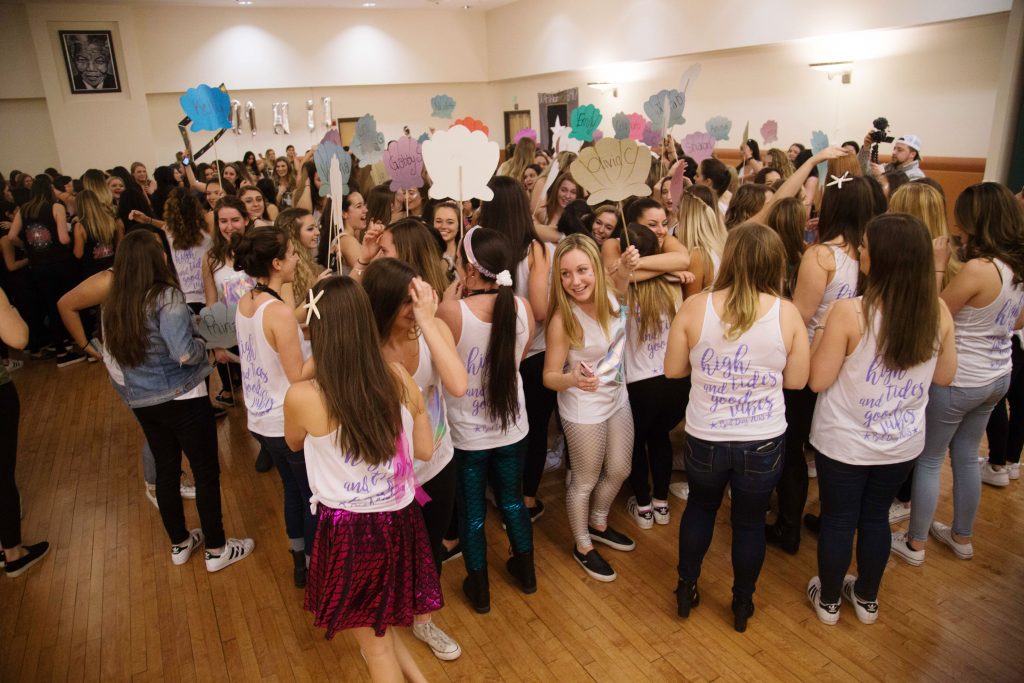
This past weekend, nearly 400 students participated in the Binghamton University Panhellenic Council’s formal sorority recruitment — the largest recruitment the council has ever seen. In the weeks prior, BU’s Interfraternity Council (IFC) chapters held their informal recruitment week, welcoming the second-largest new member class in the past five years.
While both councils aim to recruit new members in a safe environment, the differences between their processes shape two very different recruitment weeks.
About 15 percent of students at BU are involved in Greek life organizations across the seven councils, which include multicultural, professional and social organizations. Two of the councils — BU’s IFC and Panhellenic Council — have wide variations in structure that stem from differences in each council’s national governance: the National Panhellenic Conference (NPC) and the North-American Interfraternity Conference (NIC).
At BU, formal Panhellenic recruitment is held each spring. While Panhellenic Council Executive Boards organize and determine the rules for recruitment operations at BU, the NPC also offers its own set of rules, outlined in its Unanimous Agreements, which ensure fairness and equality between the organizations during recruitment procedures.
For the NIC, there are no comparable contracts. Most of the fraternity rush process is based in longstanding chapter traditions. Men can choose to attend recruitment week events at a number of fraternities or just one, limiting the breadth of their familiarity, and are not required to attend any single number of events, many of which are held off campus, where chapters host prospective members for rituals. These rituals, however, are not supposed to break any IFC rules.
While the IFC Constitution states that all official recruitment week events must be dry, it is more difficult to pinpoint violations since all events are held off campus. According to Yitzhak Maurer, president of the IFC and a junior majoring in classical and Near Eastern studies, many fraternities use parties in the first couple of weeks of the semester as a recruitment tactic.
“We’re trying to move people away from that,” Maurer said. “We want to showcase more of what Greek life can be, especially with what’s been happening in the past year or two years in the national scene of Greek life.”
At the IFC level, punishment comes in the form of fines and other actions determined by the IFC Judicial Board. According to Maurer, concerns are often brought from Coghill or members of other organizations, but there are still many issues people talk about among themselves that are not shut down.
The IFC is now contemplating how best to add formal components to the fraternity recruitment process. With 19 chapters, each with 30 to 60 members, the logistics of holding a formal fraternity recruitment would be just one of many challenges. According to Ashley Rottkamp, the president of the Panhellenic Council and a junior double-majoring in psychology and accounting, coordinating a yearly formal recruitment is easier for sororities.
“IFC is bigger and has less people in each chapter, so a formal recruitment process wouldn’t necessarily work for them, and they’ve never done it, so it would be really hard to all of a sudden do one now,” Rottkamp said.
After initiation this spring, Coghill expects there will be roughly 2,300 Greek life members on campus. According to Coghill, although the changing regulations of recruitment are leading to a positive change in Greek life overall at BU, this process takes time.
“Culture change is hard,” Coghill said. “Every year they talk through different rules and regulations to see if they can get to where they want to be, but ultimately our goal is to get as many qualified people that want this experiences as they can.”


